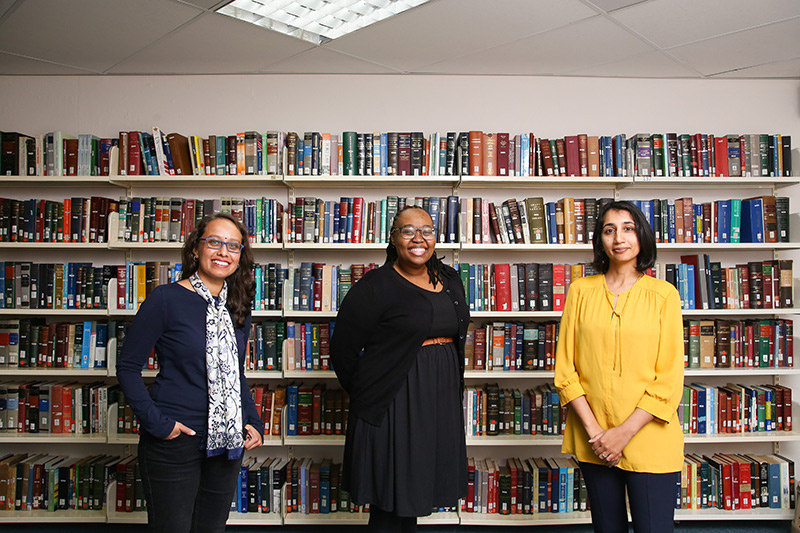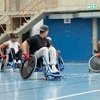Women’s Month: Law faculty trio puts fresh spin on children’s rights course
10 August 2021 | Story Nadia Krige. Photos Je’nine May. Read time 5 min.
A trio of dynamic young women is set to put a fresh spin on children’s rights in the University of Cape Town’s (UCT) Faculty of Law. Sharing a passion for this field, Mathabo Baase, Nurina Ally and Salona Lutchman will be joining forces to revive a course that will equip students to confidently participate in global conversations around children’s rights.
Formerly convened by Professor Danwood Chirwa, the children’s rights course has formed part of the Law faculty’s master’s degree programme for several years. However, when Professor Chirwa became dean in 2019, it was facilitated by a guest professor and then put on ice.
“In a way, we are bringing a slightly different spin to the course,” explained Lutchman, a senior lecturer in the Department of Public Law.
“Law is never stagnant.”
Ally, who teaches administrative law in the Department of Public Law, added: “We’re really excited about the opportunity to convene the course and to continue the important role it has played in the faculty with its unique focus on children’s rights and international law.”
“Fortunately, we’re in the type of social discipline that is always changing,” said Baase, a lecturer in the Department of Private Law. “Law is never stagnant, so our focus will be on continuing to prepare our students to take part in global conversations around children’s rights and do so within a certain framework given their specific background.”
A fresh take
Although they won’t be reinventing the wheel, the team will bring something to the course that no one else is able to: themselves.
While sharing a passion for children’s rights, each has a specific set of interests that has influenced their approach, adding depth of field to their plans to refresh the curriculum.
Currently, Baase’s research focuses on pre‑birth and abortion rights.
“I look at the sanctity of human life and unpack it from a mainly legal, but also philosophical, historical, political and sociological perspective,” she explained.

Ally’s journey with children’s rights started when she joined the Equal Education Law Centre in Cape Town. During the five years she worked there, she also completed her master’s degree in international human rights law, focusing on early childhood development (ECD) in South Africa.
“I’m really passionate about early childhood development law and policy reform,” said Ally.
It was while doing her master’s degree at New York University that Lutchman discovered her passion for children’s rights, with a specific interest in healthcare.
“I took a course on children’s rights, which grounded me and made me realise that this is an area I wanted to contribute to,” she said. “I’m also a parent, which has, in its own way, shaped my views and how I approach the theory.”
Empowering students
Building on the strong theoretical foundation of the existing course, Ally, Baase and Lutchman plan on harnessing their diverse areas of expertise to bring contemporary issues impacting children’s lives into sharper focus.
One of the ways they plan on doing this is to roll out a series of seminars featuring practitioners working in the field.
Their hope is that this will stimulate students’ critical thinking and inspire them to find their own fields of interest and expertise.
“We want to make sure that our students are at the forefront of conversations and that they’re also empowered with the necessary tools to be innovative and bring about further change, even after we are done with our academic careers – which hopefully isn’t any time soon,” said Baase.
“We want to make sure that our students are at the forefront of conversations.”
Although they are still working on the specifics of the course curriculum, the types of contemporary issues the trio is looking to focus on include education, development, healthcare and issues of child autonomy.
“We obviously can’t talk about everything, but at the end of the day, we want to give students a solid grounding in the theoretical aspects and critical thinking in areas related to children’s rights, which will allow for practitioners and academics alike to be able to think through issues related to children with that kind of lens in mind,” said Lutchman.
Praise and appreciation
While academic collaborations of this nature come with their fair share of challenges – especially during a time of remote work and social distancing – Ally, Baase and Lutchman have nothing but praise and appreciation for one another.
It all started with a simple email from Lutchman asking if Ally and Baase would be interested in meeting on a regular basis to share ideas and work on their writing together.
As Lutchman put it: “You have to create a community and be intentional about your interactions. While working at home during lockdown, you’re not going to have those organic conversations while you’re making tea in the common room or walking past somebody’s office.”
“It was just an organic and natural development from there to collaborative projects,” said Ally. “It generates energy, so you feed off the fact that other people also care about the things that you care about.”
In conclusion, Baase said: “It is very much a joint venture, a joint vision, a joint dream. We all want to empower each other, so that we can accomplish that together.”
 This work is licensed under a Creative Commons Attribution-NoDerivatives 4.0 International License.
This work is licensed under a Creative Commons Attribution-NoDerivatives 4.0 International License.
Please view the republishing articles page for more information.




























































































































































































































































































































































































































































